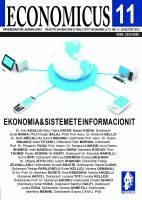Kultura financiare e të rinjve shqiptarë dhe ndikimi në ekonomi
The financial culture of Albanian youth and the impact on the economy
Author(s): Arbi AGALLIU, Sara HAFIZISubject(s): National Economy, Sociology of Culture, Economic development, Financial Markets, Socio-Economic Research
Published by: Shtëpia botuese “UET Press”
Keywords: Financial education; financial products; banking sector;
Summary/Abstract: Consumer financial literacy, especially these days, has a special importance due to the great changes that have occurred in the financial market in a global context. Current economic crisis and changes increase the complexity of financial decisions faced by individuals. On the other hand, financial literacy is a very important element that affects economic life and the choices that consumers make. Furthermore it affects the entire economy of a country. For this reason, individuals with a strong financial knowledge, make more responsible and accurate decisions, contributing not only to the growth of personal welfare but also the welfare of the whole country. Financial education provideslong-term positive results for the economy of a country. For this reason, the present study is focused on testing the financial culture of Albanian youth (students) who represent the future family member and financial consumer (in short run). But, are Albanian youth ready to manage and resolve financial problems? Hence, do they have sufficient financial knowledge? Are they able to make decisions about money; how to save and how to spend? Do young people recognize the Albanian financial products? On which factors depends the financial literacy of students? This paper will address exactly that; the deficiencies in youth financial education and the problems they face. First, the theoretical framework of the paper will be laid out. The method used is survey based, then data are processed through a SPSS program to be further analyzed by a multiple linear regression. The paper also builds on a theoretical analysis (literature review) by developing a comparative and descriptive analysis.
Journal: ECONOMICUS
- Issue Year: 11/2013
- Issue No: 1
- Page Range: 5-12
- Page Count: 8
- Language: Albanian

